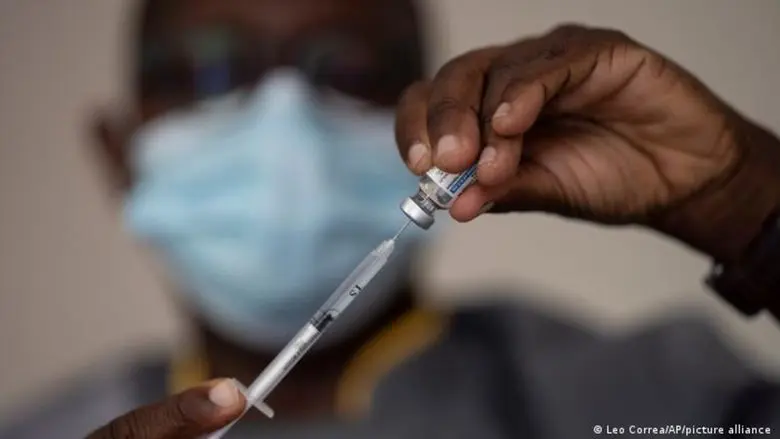Only 7 percent of Africans have been vaccinated, but the number of newly registered cases there is much lower than in Europe, Deutsche Welle reports. What is the reason?
Far fewer new COVID-19 infections are currently reported in Africa than in Europe. But the danger still looms over the continent, with only 7 percent of the 1.3 billion population fully vaccinated.
Many cases are not registered at all
If statistics are to be believed, the trend in Africa is that the pandemic is much lower. According to the Office for Epidemics of the African Union, 8.5 million cases have been reported so far, of which 220,000 have died.
However, there are probably many hidden cases. “We estimate that less than 15% of COVID-19 infections have been reported on the continent,” Stefan Exo-Kreischer, director of the humanitarian organization ONE, told SG. According to him, there are seven times more people infected in Africa than the statistics show.
“COVID-19 is gone. When was the last time you heard of someone dying of COVID-19?” Niasha Ndou of Zimbabwe told the German newspaper The Welt, explaining that he still carried a mask in his pocket just to do not fine him. Concerts, large political rallies and private parties with more people have long been allowed in the country.
The World Health Organization (WHO) has also noted that the number of new infections in Africa has been declining since July. Despite doubts about statistics coming from some African countries, the worst that many feared was clearly prevented: the uncontrolled spread of the pandemic with millions of victims. Scientists still cannot give an unambiguous explanation for this happy development.
The average age of the population and living outside are probably among the leading factors
“There’s something mysterious,” said Wafaa El-Sadr of Columbia University in New York. He is referring to what many others say: in Africa the number of vaccinated is much lower than in Europe and the United States, the continent is chronically short of vaccines, but the trend is still positive. Africa is among those parts of the globe that are least affected by the pandemic.
Scientists point to several factors that determine the weakness of the coronavirus in Africa. First, the continent’s population is very young – the average age is 20 years compared to Western Europe, where the average age is 43. Second, in Africa most people live in small villages rather than large cities, where the pandemic is spreading faster. . Africans also spend a lot more time outdoors, which also reduces the risk of infection. Several scientific studies are currently addressing the question of whether any genetic predispositions and other diseases play a role.
Moreover, strange as it may seem, the continent was better prepared for the pandemic than Western industrial societies. Africans have experience in dealing with epidemics even without vaccines, explains Christian Happi of Reedemer University in Nigeria. According to him, the wide network in which the local health authorities are connected is crucial. “It doesn’t always depend on money and modern hospital equipment,” he said.
Devi Sridhar of the University of Edinburgh claims that a number of African governments have reacted quickly – for example, Mali closed its border after the first registered cases in the country. “These countries have welcomed COVID-19 with humility because they have experienced things like Ebola, polio and malaria in the past,” said the health expert. The WHO estimates that coronavirus victims in Africa now make up only 3% of all victims, while deaths in Europe account for 29% and in North and Latin America for 46%.
Africa urgently needs vaccines
Doctors in Zimbabwe are happy that the numbers are not alarming at the moment. At the same time, they warn that great care must be taken. Dr. Johannes Marisa, president of one of the local medical unions, fears a new wave could hit his country hard in December. “Our negligence can ruin us. Because the new wave can hit us like thunder from a clear sky,” says the doctor.
The WHO estimates that only 5 African countries will have vaccinated at least 40% of their population by the end of the year.
Nigerian virologist Oyewale Tomori, who is among the WHO experts, even believes that in the end Africa may be less dependent on vaccines than the West. This does not negate the fact that Africans urgently need vaccines. “We need to carry out mass vaccinations to protect ourselves from the fourth wave,” said South African epidemiologist Salim Abdul Karim.
Poor countries do far fewer tests
All over the world, the pandemic does not seem to affect poor countries so badly. This is true, for example, of Afghanistan, where almost no one wears a mask these days. But here again the suspicion arises that the statistics are probably incorrect and greatly underestimated.
“The good balance is actually due to the fact that far fewer tests are being done,” South African virologist Dr. Wolfgang Pryser told the State News Agency. He claims that three times more people have died from COVID-19 in his country than official statistics show. Not to mention that the pandemic makes it difficult to treat a number of other diseases, recalls Dr. Pryser. “I am afraid that the final account of the damage from the pandemic will not be presented to us until the coming years,” said the doctor.







